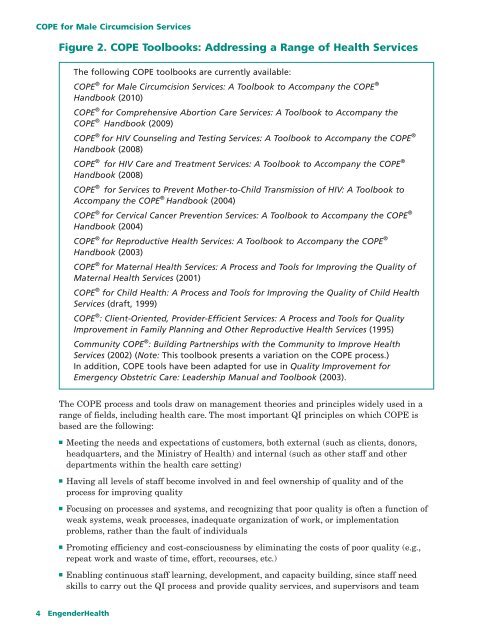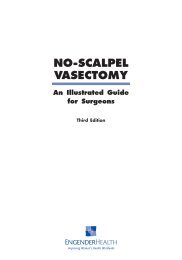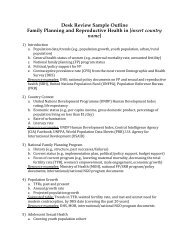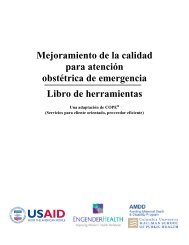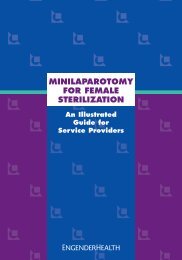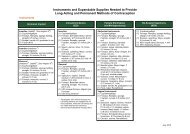COPE® FOR MALE CIRCUMCISION SERVICES - EngenderHealth
COPE® FOR MALE CIRCUMCISION SERVICES - EngenderHealth
COPE® FOR MALE CIRCUMCISION SERVICES - EngenderHealth
Create successful ePaper yourself
Turn your PDF publications into a flip-book with our unique Google optimized e-Paper software.
COPE for Male Circumcision Services<br />
Figure 2. COPE Toolbooks: Addressing a Range of Health Services<br />
The following COPE toolbooks are currently available:<br />
COPE ® for Male Circumcision Services: A Toolbook to Accompany the COPE ®<br />
Handbook (2010)<br />
COPE ® for Comprehensive Abortion Care Services: A Toolbook to Accompany the<br />
COPE ® Handbook (2009)<br />
COPE ® for HIV Counseling and Testing Services: A Toolbook to Accompany the COPE ®<br />
Handbook (2008)<br />
COPE ® for HIV Care and Treatment Services: A Toolbook to Accompany the COPE ®<br />
Handbook (2008)<br />
COPE ® for Services to Prevent Mother-to-Child Transmission of HIV: A Toolbook to<br />
Accompany the COPE ® Handbook (2004)<br />
COPE ® for Cervical Cancer Prevention Services: A Toolbook to Accompany the COPE ®<br />
Handbook (2004)<br />
COPE ® for Reproductive Health Services: A Toolbook to Accompany the COPE ®<br />
Handbook (2003)<br />
COPE ® for Maternal Health Services: A Process and Tools for Improving the Quality of<br />
Maternal Health Services (2001)<br />
COPE ® for Child Health: A Process and Tools for Improving the Quality of Child Health<br />
Services (draft, 1999)<br />
COPE ® : Client-Oriented, Provider-Efficient Services: A Process and Tools for Quality<br />
Improvement in Family Planning and Other Reproductive Health Services (1995)<br />
Community COPE ® : Building Partnerships with the Community to Improve Health<br />
Services (2002) (Note: This toolbook presents a variation on the COPE process.)<br />
In addition, COPE tools have been adapted for use in Quality Improvement for<br />
Emergency Obstetric Care: Leadership Manual and Toolbook (2003).<br />
The COPE process and tools draw on management theories and principles widely used in a<br />
range of fields, including health care. The most important QI principles on which COPE is<br />
based are the following:<br />
■ Meeting the needs and expectations of customers, both external (such as clients, donors,<br />
headquarters, and the Ministry of Health) and internal (such as other staff and other<br />
departments within the health care setting)<br />
■ Having all levels of staff become involved in and feel ownership of quality and of the<br />
process for improving quality<br />
■ Focusing on processes and systems, and recognizing that poor quality is often a function of<br />
weak systems, weak processes, inadequate organization of work, or implementation<br />
problems, rather than the fault of individuals<br />
■ Promoting efficiency and cost-consciousness by eliminating the costs of poor quality (e.g.,<br />
repeat work and waste of time, effort, recourses, etc.)<br />
■ Enabling continuous staff learning, development, and capacity building, since staff need<br />
skills to carry out the QI process and provide quality services, and supervisors and team<br />
4 <strong>EngenderHealth</strong>


